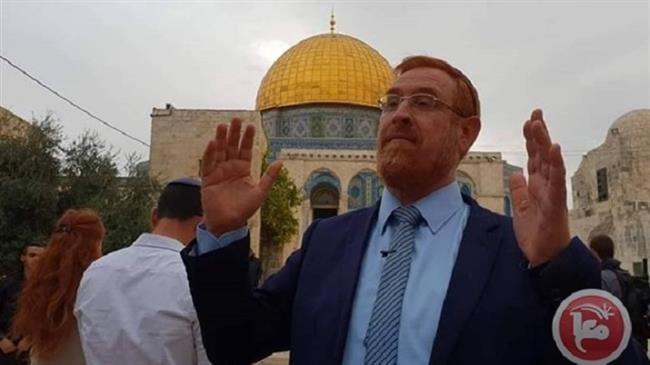
RNA - The Palestinian Ma'an news agency, citing Firas al-Dibs, spokesperson of the Islamic Waqf (Endowment) organization, said that Israeli’s Knesset member Yehuda Glick, who is a member of the ruling party of Likud-National Liberal Movement, and dozens of other Israeli settlers stormed the compound on Monday.
The report added that Glick, who campaigns for expanding the settlers’ access to the al-Aqsa compound, entered there for the Jewish holiday of Hanukkah, performed prayers with his companions while under the armed protection of Israeli forces and police, who had been deployed across the area.
The number of Israeli lawmakers, or members of the Knesset, who storm the sacred compound, has increased in the past few months after Prime Minister Benjamin Netanyahu decided in July to allow the legislators to visit the compound once every three months following a restriction of access that has been in place since October 2015.
Most of the Knesset members are right-wing extremists, who support the demolition of the Islamic site in order to build a Jewish temple instead, on what is known among settlers as the Temple Mount.
On November 18, Uri Ariel, the minister of agriculture and rural development in the occupied territories, and dozens of other Israeli settlers stormed the compound. The Israeli minister had previously stormed the compound in September.
The al-Aqsa Mosque compound sits just above the Western Wall plaza and houses both the Dome of the Rock and the al-Aqsa mosque.
Tensions continue in the occupied Palestinian territories as part of the aftermath of US President Donald Trump's recognition of Jerusalem al-Quds as Israel’s "capital" and relocation of the US embassy to the occupied city.
On December 21 last year, the United Nations General Assembly overwhelmingly voted in favor of a resolution that calls on the US to withdraw its controversial policy shift.
Despite the vote, the US went ahead with the embassy transfer on May 14, triggering demonstrations in the occupied Palestinian territories, Iran, Turkey, Egypt, Jordan, Tunisia, Algeria, Iraq, Morocco and other Muslim countries.
Angered by Trump’s move, Palestinian President Mahmoud Abbas boycotted his administration, saying Washington is no longer qualified to serve as the sole mediator in the decades-long conflict with Israel, and that an international mechanism should be devised to replace the US in the so-called peace process.
847/940